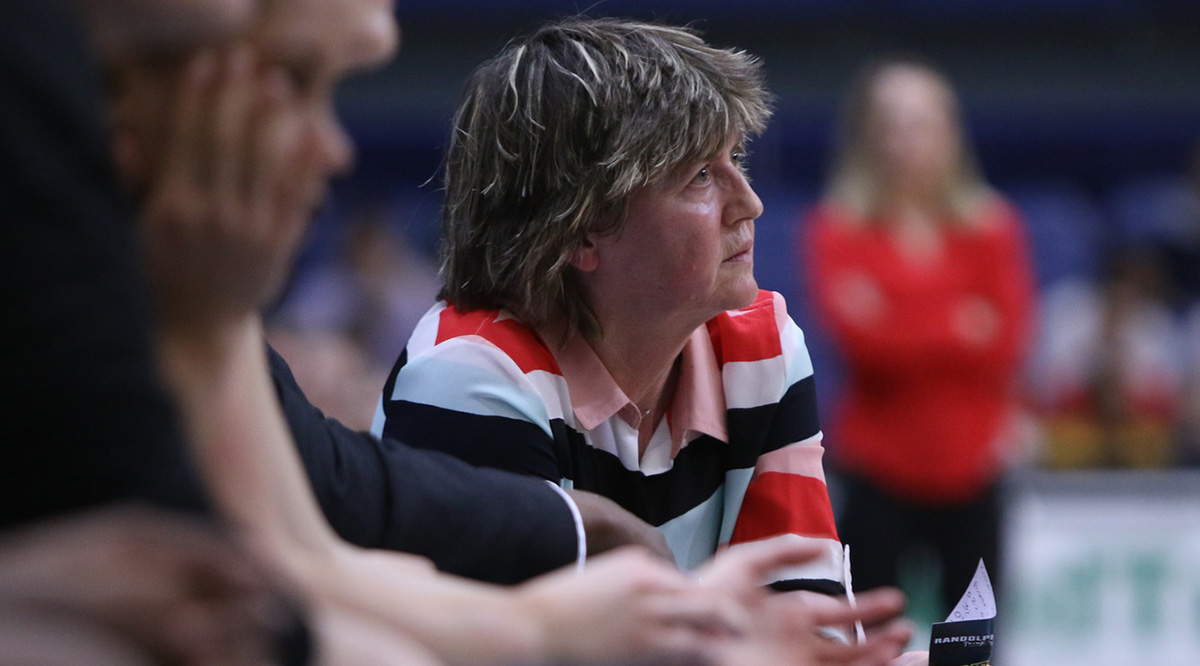
|
| Carroll LaHaye is in her 38th season at Randolph-Macon, with 636 career victories. Randolph-Macon athletics photo |
By Ryan Scott
D3sports.com
I spent this week talking with five coaches, retired and active, all with long tenures in one location and a combined 4,000 victories. It is one of the great privileges of this job. Two weeks ago this column was about coaches who’ve built successful programs at multiple schools and it made me curious about how being successful in one place for a long time might be different.
Turns out: it’s really not.
“The goal is to get a job, then try like crazy to make it a place people want to be,” says Glenn Robinson, who retired from Franklin & Marshall in October, after 48 seasons on the sidelines and more wins than anyone else in the history of Division III basketball.
There are reasons to leave even a good situation — you’ve reached a ceiling, money, career advancement, being closer to family — but if it feels like home, that might be all a coach needs.
“I did not see myself staying here forever,” says Carroll LaHaye, women’s coach at Randolph-Macon. “But it’s turned into forever. The years just fly by when you’re having fun!”
“My biggest pride is the kids I’ve had the opportunity to coach,” says Connie Tilley, until this season the only women’s basketball coach St. Norbert has ever had. “When your former players bring their kids [to visit the school] you know you’re old, but it means a lot. If I helped them in any bitty part of their life, I feel really good about that.”
Tilley was just seven wins shy of 700 and Robinson certainly has the stature and ability to hang around and get 1000 if he so chose, but both noted great confidence in the intangible feeling that “it’s time.”
“I wasn’t doing quite as good a job as I had been,” says Robinson. “I was not as sharp or energetic as I had been and I didn’t want to slow the team down.”
Adds Tilley: “It’s not that I lacked energy with basketball, but the other stuff: administrative duties, campus politics, especially when we weren’t in season. I did not want to dread going in to the office over the summer or feel guilty about missing an AAU tournament. I miss the game, the coaching, and the kids immensely, but it’s what’s best for the program.”

|
| Connie Tilley had to coach multiple sports when she started her college coaching career. d3photography.com photo |
Ensuring the system survives without you seems to be the mantra of every long-tenured coach. Most note that good players want to play with other good players and recruiting success often builds on itself.
“If you establish good leadership among the players, the older guys teach the younger players,” says Steve Moore, who is handing off the reins of Wooster basketball to long-time assistant Doug Cline after this season. “We put a lot of work into the program over the years, former players have stayed involved, and Coach Cline has been a huge part of what’s happened here. The program is going to continue to be successful.”
Legacy is certainly on the minds of long-tenured coaches, even if talking about it in those terms isn’t comfortable for these coaches (who are incredibly humble, across the board, especially given their collective accomplishments).
Dave Hixon (probably) isn’t done coaching Amherst basketball, but he’s getting a rare early glimpse at what retirement might be like, taking a year off, partly to help transition his father into a new stage of life, following the death of Hixon’s mother a year ago.
Former player and current assistant, Aaron Toomey, is guiding the ship in the interim and Hixon can see the shadow he’s casting. “I’ve only been to two [Amherst] games this year, so as not to be a distraction – and I was a distraction – so I mostly watch from home. People seem to think I never lost a game, which is frustrating to me for Aaron. I keep telling them I lost almost 300, so don’t worry about it!”

|
| Glenn Robinson recently spent the first half of a Franklin & Marshall game sitting alone in the baseline bleachers, making occasional notes. |
Still, the idea of not being on the sideline any longer is not something you can understand until it happens. “That’s hard,” says Robinson, his shortest, most serious answer of the interview, when I asked how it is watching a game without coaching. Robinson, always a vocal presence, often has to move around the gym or start conversations with people to distract himself during tense moments. “It’s absolutely the most difficult thing.”
“I was very sad the first day of practice,” says Tilley. “I put so much of my life into my career, cutting it off like that is difficult. I hope I can become a really good fan.”
When discussing retirement, there’s a real sense of mourning – and rightly so. They are not losing a person, obviously, but they are losing a significant part of their lives.
“Even when I come back,” says Hixon, “it won’t be for long. I’m not going to be coaching when I’m 75; there will be a ‘next’ and I have to figure out what that is. Everybody goes through this stuff; it’s life.”
LaHaye is not yet thinking about retirement, but it’s also not a subject she can completely avoid. “In recruiting,” she says, “parents used to ask if I would be around four years, which is a legitimate question. Now they ask how long I’ll be around. I was offended at first, but I’ve been here 40 years, so that’s a legitimate question, too.”
For LaHaye, she’s just going to continue to evaluate her coaching as she does every year. “I have a checklist – what could I have done better, where did we do well, where can we improve, are we playing to our potential – I assume you retire when you get to the point you don’t want to do it anymore or you can’t do what needs to be done. I’m still enjoying the challenges and handling the stress.”
My day job is as a pastor – unusual, I know, for a sports writer – but I found unexpected camaraderie with the coaches as we spoke. Both of us spend our lives encouraging people to sacrifice for something larger than themselves. Numbers can be validation of that effort, but wins alone will not equal fulfillment. More than anything else, what makes long tenured coaches successful is that recognition.
“It’s never been about the numbers,” says Tilley, who, when asked about how retirement is going said, repeatedly, “I still get to see the kids.”
Adds Robinson, “You can win 22 games one year, but you should have won 25 and there’s disappointment in that. Other years you can win 15 when you should’ve won 11 and that’s success. We want the individual players and, of course, the team to play to their potential.”
“I had one player recently who told me she learned from me the importance of thanking people,” says LaHaye. “That means more to me than any out-of-bounds play, any defensive stop, or even a championship.”
“I interviewed and was offered a couple D-I jobs,” says Hixon. “But I thought I’d have to sacrifice part of myself I didn’t want to sacrifice to be at that level. This is the way college sports is supposed to be. We do it right!”
“It’s a good feeling to know you may have had a positive impact on the lives of the players,” says Moore, in his typical understated fashion. Perhaps the least flashy, least outspoken coach I’ve ever run across, his legacy lives in the love and loyalty alums and the community so obviously have for him. “It’s really good to hear from the former players that their experience at Wooster was a positive, enjoyable experience.”

|
| Wooster athletics file photo |
Perhaps the sweet spot of retirement, when you “just know” it’s time, coincides with a fuller appreciation of just how important relationships are. Robinson is enjoying more time with his grandchildren. Hixon gets to see his son, an Olympic medal-winning diver, compete in person far more than he would during a coaching year. Tilley is taking care of herself: “I worked in a gym almost every day of my life. Now I’m there every day working out; I’ve never done that before. I have hobbies now! I’m very happy the decision I made is working out how I wanted.”
All coaches sacrifice greatly for their teams – it’s only by example that you can get players to do the same. However, I’d be remiss not to mention the sacrifice of women coaches, like LaHaye and Tilley and so many others.
“It was not always so easy,” says LaHaye. “Opportunities were few and far between. When I started, if I wanted the [basketball] job, I had to also coach lacrosse and soccer, which I knew nothing about. I spent the summer teaching myself skills in those sports so I could teach them to the players. You couldn’t recruit – there was no time – you had to play with who showed up!”
Tilley also had three sports in her purview when she began. “I was lucky the volleyball players were so talented, that helped a lot. There were days when I had a two-hour volleyball practice, then a two-hour basketball practice, and this was all after teaching classes all day. I don’t know how I did it.”
It’s a mixed bag that so many young players today see the advent of Title IX as ancient history, not all that different from the way they might view George Washington, but as Tilley says, “It took a lot of courageous people all across the country to get us to where we are now.”
Any long-tenured coach has stories about the changes they’ve witnessed in the game over time (and the great thing is, especially when they retire, they’re always happy to tell them). Each admits, though, it’s much more difficult to win today than it ever has been.
Randolph-Macon may have more resources now for their women’s team than when LaHaye began, but so does every team with which they compete. Tilley notes among her proudest accomplishments the way St. Norbert has been able to recruit and compete in Wisconsin, against so many strong, large, public-school programs.
“AAU has really come to fruition,” says Hixon. “These players all – at every school – have just played so many more games before college than players in the past. Every team is talented. It’s much harder to win 20 games now than it was even three seasons ago.”
I guess it’s pretty fortunate, then, that it’s not about the wins.
